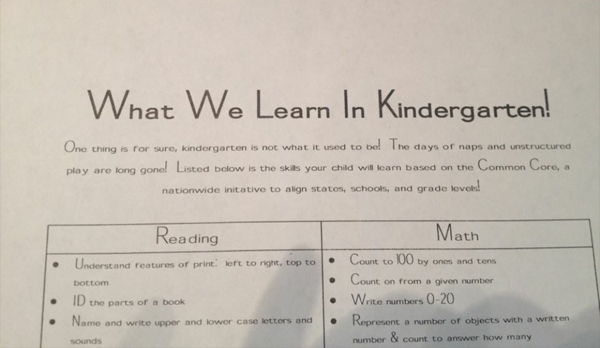Can 5-year-olds in Mississippi conquer the Common Core?
Standards are becoming harder and Mississippi kindergartens start school behind their peers in other states

A worksheet that Kathy Glover’s kindergartener brought home from school to introduce the new Common Core standards. Courtesy of Kathy Glover
BROOKHAVEN, Miss.— It was only 10:30 a.m. on a late spring day at Enterprise Attendance Center, and Landon Delcambre had already learned how to make estimates while watching six students guess the number of buttons in a jar. He had listened to a weather report from two students. And in what was perhaps the highlight of lesson-filled day, he’d counted to 100 with the help of a YouTube video featuring a “counting superhero.”
Landon, six, is among the Mississippi kindergarten students who are learning new, more challenging academic standards such as counting to 100 by ones and tens. For many years, they only needed to count to 20 before moving on to first grade.
He doesn’t find the new standard too hard. “I already knowed how to count to 100,” Landon said calmly, sitting back at his desk after the video. “I didn’t learn it. I just knew for years.”
Yet Landon’s confidence isn’t shared by some educators and experts who argue the new standards are too hard for students just starting school, even though it appears they are here to stay. Against a swirl of protest, Gov. Phil Bryant in April vetoed a bill that would have forced the state to re-examine Common Core Standards adopted five years ago for all grades.
Now called the Mississippi College-and-Career Readiness Standards, the standards are particularly challenging in the early grades like kindergarten, where students are expected to learn skills previously expected from 7- or 8-year-olds.
Nationally, more than 40 states have adopted or adapted Common Core, with ensuing questions about how well they were suited for each K-12 grade. However, the changes to kindergarten have garnered special outrage. While some supporters say young learners are fully capable of mastering these new standards, early childhood experts insist some standards are too tough and will further pull kindergarteners away from traditional, play-based learning.
Often it’s parents who are flummoxed by the changes to what used to be a softer, more relaxed introduction to school.
“I was just blown away that they wanted a kindergartener to know that much,” said Mississippi parent, Kathy Glover, referring to noticeable instructional changes for her second child.
“I was thinking, ‘Does second grade now start in kindergarten?’” she said.
Message to parents: ‘Days of naps and unstructured play are long gone!’
In Mississippi, where a 2013 survey of teachers found that 40 percent of students in the state arrive unprepared for kindergarten, the new standards are truly daunting. Teachers surveyed said that some students were unable to hold crayons or identify colors. A 2014 state reading exam found that about 65 percent of Mississippi’s kindergarten students did not meet the benchmark score for early literacy skills, which includes being able to distinguish between lower and upper case letters.
Related: Why is ‘high quality’ so elusive in Mississippi’s child care centers?
When the state adopted the Common Core standards, it was in the hopes that they would “put students on a level playing field regardless of their ZIP code,” according to the state education website. But like the majority of states, kindergarten attendance is optional in Mississippi, and the state’s fledging pre-K program and piecemeal private options means more than half of 3- and 4- year-olds did not attend preschool programs between 2011 and 2013.
That has fueled concerns that with new, more challenging goals, students who did not attend preschool or kindergarten could enter school even further behind than they would have in previous years.
Glover’s children attend school in Lowndes County, and she remembers a strong emphasis on phonics and handwriting when her Can 5-year-olds in Mississippi conquer the Common Core? - The Hechinger Report:
